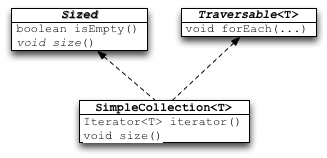No, because multiple inheritance is already present in Java. Multiple inheritance of interface types has been a feature of the language since its beginning. Default methods do introduce a new kind of multiple inheritance, namely multiple inheritance of behaviour. Java will still not have multiple inheritance of state, as for example C++ has.
Here is an example of multiple inheritance of behaviour. The new interface java.util.Sized declares methods size and isEmpty and provides a default implementation of the latter:
public interface Sized {
public default boolean isEmpty() {
return size() == 0;
}
public int size();
}
The new interface java.util.Traversable<T> declares the method forEach and provides a default implementation:
public interface Traversable<T> { public default void forEach(Block<? super T> block) { for (T t : this) { block.apply(t); } } }
Suppose we now declare a class SimpleCollection<T> and provide it with implementations of iterator and size:

class SimpleCollection<T> implements Sized, Traversable<T> {
public Iterator<T> iterator() { ... }
public int size() { ... }
}
then, given a declaration
SimpleCollection<String> sc = new SimpleCollection<>();the following statements all compile:
Sized s = sc; // SimpleCollection is a subtype of Sized
Traversable<String> t = sc; // SimpleCollection is a subtype of Traversable
System.out.println(sc.isEmpty()); // Default implementation of isEmpty available from Sized
sc.forEach(System.out::println); // Default implementation of forEach available from Traversable
interface java.util.functions.Block

Leave a Reply